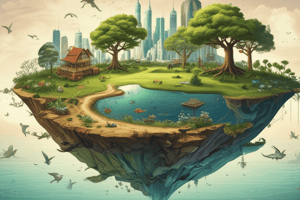Podcast
Questions and Answers
What is the core concept of sustainability?
What is the core concept of sustainability?
- The ability to continue over a long period of time
- The protection of ecological integrity (correct)
- The desire to live, survive, and reproduce
- The development of three dimensions
What was the main influence of the concept of sustainability?
What was the main influence of the concept of sustainability?
- The Brundtland Commission (correct)
- The Latin word sustinere
- Increasing environmental pollution
- The three dimensions of sustainability
What are the three dimensions of sustainability?
What are the three dimensions of sustainability?
- Environmental, economic, and social (correct)
- Environmental, cultural, and economic
- Economic, social, and cultural
- Social, environmental, and cultural
What is the current geological epoch called?
What is the current geological epoch called?
What is the main goal of sustainability?
What is the main goal of sustainability?
Flashcards are hidden until you start studying
Study Notes
-
The concept of sustainability is difficult to define and has varied over time.
-
Sustainability is often thought of as a long-term goal, and it is connected to the ability of people to safely coexist on Earth.
-
The three dimensions of sustainability are environmental, economic, and social.
-
Sustainability is often considered a normative concept, which means that it is connected to what people want for the future.
-
The concept of sustainability was strongly influenced by the Brundtland Commission.
-
Sustainability is the ability to continue over a long period of time.
-
The concept of sustainability is derived from the Latin word sustinere (tenere, to hold; sub, under).
-
Sustainability used to refer to environmental sustainability and simply meant using natural resources in a way so that people in the future ("future generations") could continue to rely on their yields in the long term.
-
The idea itself goes back to times immemorial, as communities have always worried about the capacity of their environment to sustain them in the long term.
-
Sustainability is closely related to the "three dimensions of sustainability" concept.
-
Sustainability can be considered a broader concept than sustainable development because the latter focuses mainly on human well-being.
-
Development of three dimensions: the environmental, the social, and the economic.
-
The three dimensions of sustainability are environmental, economic, and social.
-
The environmental dimension should be viewed as the most important.
-
Sustainability reflects the most basic concern of human existence, namely the desire to live, survive, and reproduce.
-
The protection of ecological integrity (or environmental sustainability) can be seen as the core of sustainability.
-
Increasing environmental pollution in the 1960s and 1970s led to growing environmental concerns.
-
Awareness of pollution provided the basis for what was later discussed as sustainability and sustainable development.
-
This process began with concern for environmental issues (natural ecosystems or natural resources and human environment) in the 1970s, and was later extended to all the systems that matter.
-
The concept of sustainability has been around for centuries, but became more popular in the 20th century.
-
Sustainability is about making sure that the environment can continue to provide benefits for humans in the future.
-
Environmental pollution is a major concern, and reducing these impacts would improve sustainability.
-
There is disagreement about the economic dimension of sustainability, but it is necessary for reducing poverty and improving well-being.
-
The overall impact of humans' activities not only on the biosphere but even on the geological formation of the Earth led Paul Crutzen to speak of the current geological epoch as the Anthropocene.
-
The impact of human activity on local to global ecosystems can reach tipping points beyond which irreversible harmful developments will be triggered.
Studying That Suits You
Use AI to generate personalized quizzes and flashcards to suit your learning preferences.



